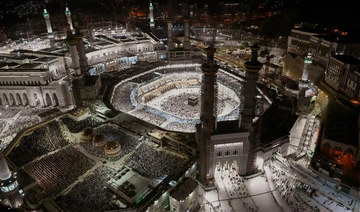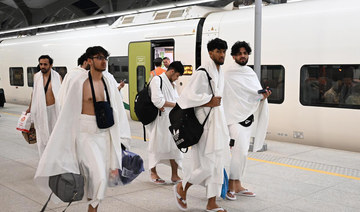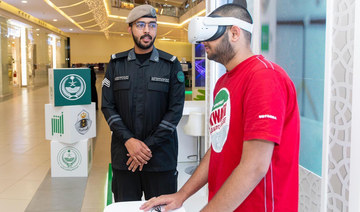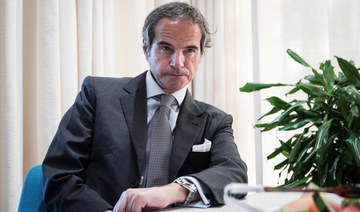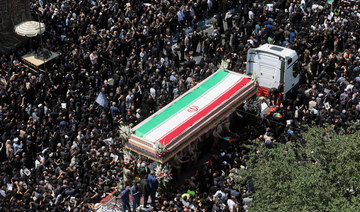RIYADH: More than 1 million laboratory tests were conducted on pilgrims at Makkah hospitals during Ramadan, the Ministry of Health announced here on Friday.
According to figures revealed by the ministry, a total of 362,457 samples were received and 1 million clinical reports were disbursed by these hospitals during Ramadan.
An official from the ministry said that during the same period, blood banks in Makkah received 6,498 units of blood from voluntary donors among citizens and expatriates.
Meanwhile, the ministry declared that the Umrah season during Ramadan this year was free from epidemic diseases in the holy cities of Makkah and Madinah. A preventive plan set in place by the Agency for Public Health involved measures for disease prevention, surveillance and quick response to cases that could develop into epidemiological outbreaks.
The Makkah Health Affairs General Directorate has harnessed all capabilities for serving pilgrims around the clock. Health services are provided by the holy city’s seven hospitals, as well as King Abdullah Medical City, Ajyad and Al-Noor hospitals.
Millions of local and foreign pilgrims visit the holy mosque in Makkah for Umrah and Haj pilgrimages. The Ministry of Health implements a strategic program every year for Haj and Umrah seasons to cater the health needs of visitors.
According to the Makkah Health Affairs General Directorate, hospital and health facilities in Makkah treated 50,000 emergency cases during the first three weeks of the holy month. More than 5,000 patients were admitted to Makkah hospitals during this period, 27,000 patients were treated in clinics; and over 600 babies were delivered.
Over 1 million lab tests conducted on pilgrims at Makkah hospitals during Ramadan
Over 1 million lab tests conducted on pilgrims at Makkah hospitals during Ramadan
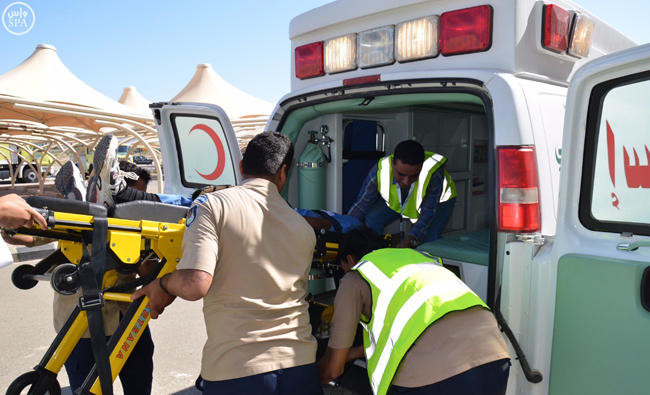
Black cloth covering Kaaba in Makkah raised ahead of Hajj
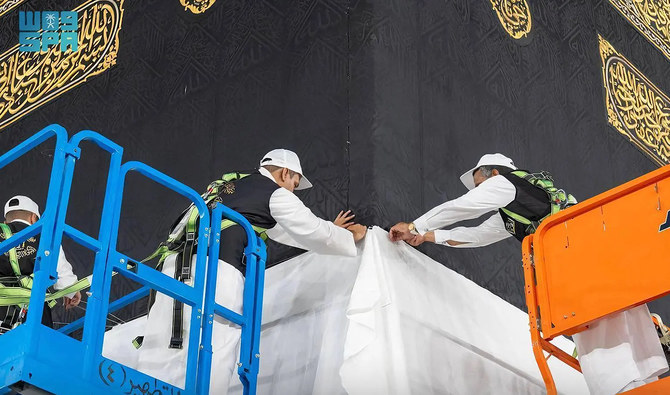
- Procedure meant to keep the cover, Kiswa, free from getting soiled and tampered
- 36 specialized technical personnel carried out procedure with aid of 10 cranes
RIYADH: In keeping with the annual tradition, officials raised the lower part of the kiswa — the elaborately designed black cloth covering the Kaaba — in Makkah on Wednesday ahead of this year’s Hajj pilgrimage.
As approved by the General Authority for the Care of the Affairs of the Two Holy Mosques, the exposed part was covered with a white cotton fabric, two-and-a-half meters wide and 54 meters long on all four sides, according to the Saudi Press Agency.
Carrying out the procedure were 36 specialized technical personnel with the aid of 10 cranes.
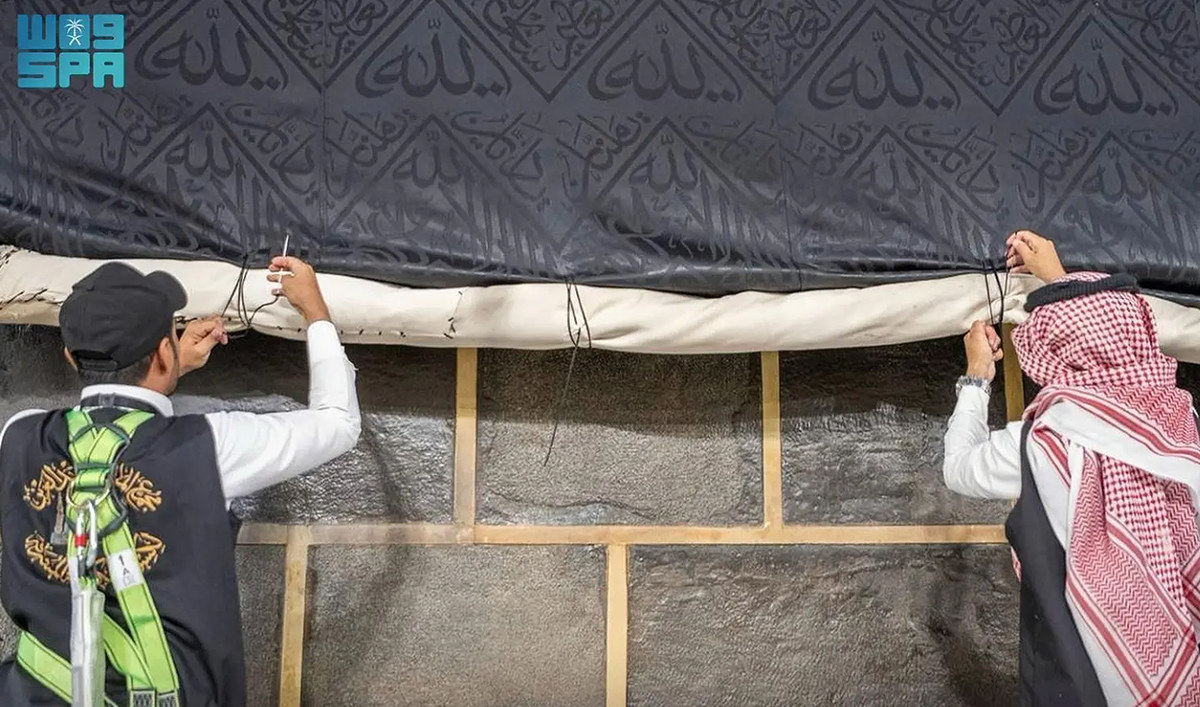
As described in the SPA report, the kiswa is lifted in several stages: It starts with unscrewing the bottom of the cover from all sides, separating the corners, then untying the bottom rope and removing it from the fixing rings, after which the cloth is rolled upward. The lanterns are then dismantled and the white cloth are put in place, after which the lanterns are reinstalled over the white cloth until the final stage.
The procedure is repeated every year to protect the kiswa from getting soiled and damaged as pilgrims circumambulate the Kaaba.
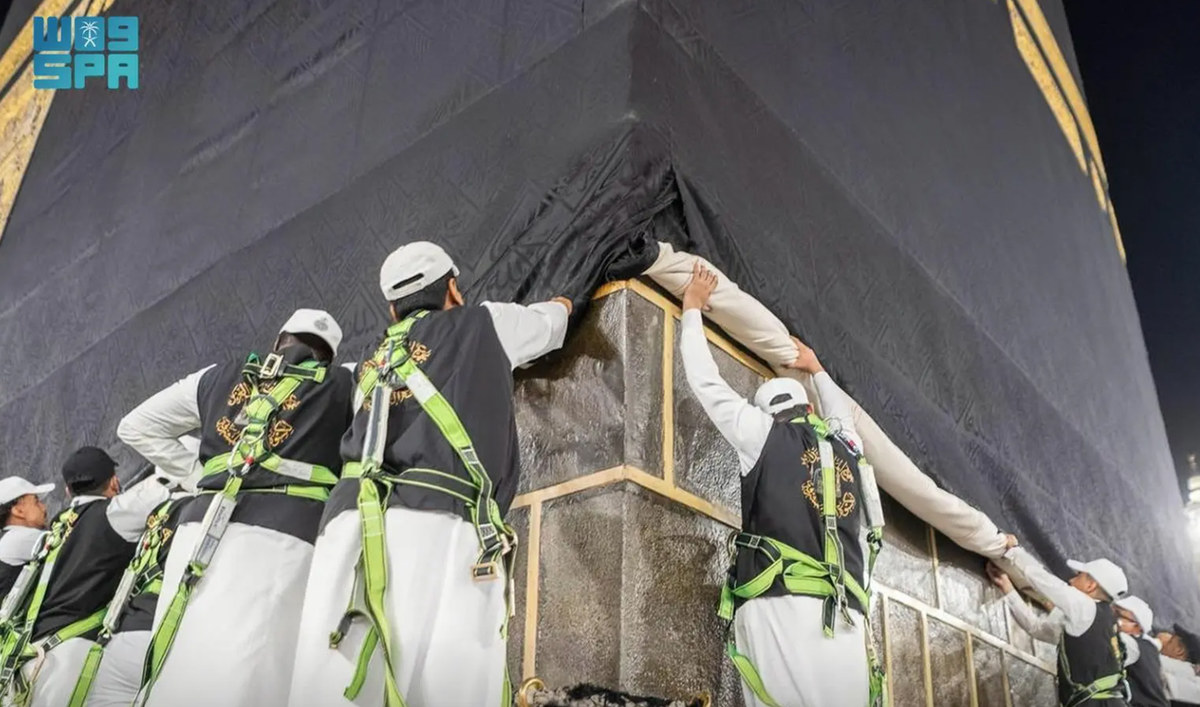
The annual Hajj in Saudi Arabia is considered the world’s largest human gathering, with year 2012 marking the biggest number of participants at 3.16 million.
At the height of the COVID-19 pandemic, Saudi authorities allowed only a symbolic observance of Hajj with just a thousand pilgrims. The numbers were gradually raised as the health crisis was placed under control worldwide. Last year, almost 1.84 million pilgrims performed the “once in a lifetime” journey and the figure is expected to go higher this year.
Every year, on the ninth day of the Islamic month of Dul Hijjah, the black silk cloth is removed and a new kiswa is draped in its place.
Saudi Arabia welcomes move by Norway, Ireland and Spain to formally recognize Palestinian state
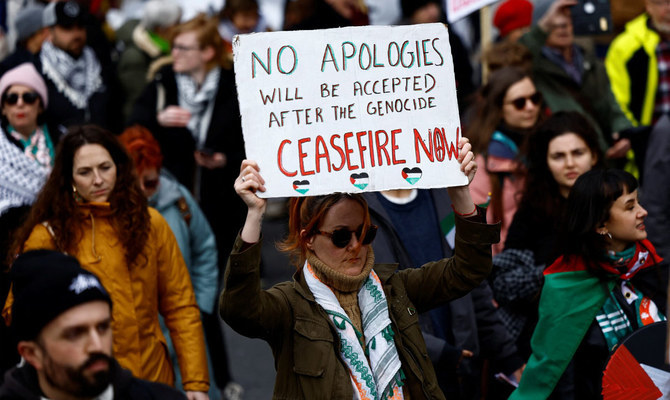
- Palestinian Authority and its rival group Hamas both welcomed the recognition
- Israel recalls envoys to Spain, Ireland and Norway for consultations
RIYADH/COPENHAGEN: Saudi Arabia said Wednesday it welcomed the “positive” decision taken by Norway, Spain, and Ireland to recognize a Palestinian state.
The Kingdom said it appreciated this decision “which confirms the international consensus on the inherent right of the Palestinian people to self-determination,” in a foreign ministry statement.
The kingdom also called on more countries to swiftly take the same stance, “which would contribute to finding a reliable and irreversible path to achieve a just and lasting peace that fulfills the rights of the Palestinian people.”
Leaders of Norway, Spain and Ireland said on Wednesday they were formally going to recognize Palestine as a state.
Norwegian Prime Minister Jonas Gahr Store said: “There cannot be peace in the Middle East if there is no recognition.”
Spanish Prime Minister Pedro Sanchez also announced that the country’s council of ministers would recognize an independent Palestinian state on Tuesday May 28.
“Next Tuesday, May 28, Spain’s cabinet will approve the recognition of the Palestinian state,” he said, adding that his Israeli counterpart Benjamin Netanyahu was putting the two state solution in “danger” with his policy of “pain and destruction” in the Gaza Strip.
Irish Prime Minister Simon Harris said it was a move coordinated with Spain and Norway, marking “an historic and important day for Ireland and for Palestine.”
The Palestinian Authority and its rival group Hamas both welcomed the recognition of a Palestinian state by Ireland, Spain and Norway.
The Palestinian Authority exercises limited self-rule in the West Bank territory while Hamas runs Gaza.
Jordan hailed the coordinated move as an “important and essential step towards Palestinian statehood.”
“We value this decision and consider it an important and essential step towards a two-state solution that embodies an independent, sovereign Palestinian state along the July 1967 borders,” Jordanian Foreign Minister Ayman Safadi told a press conference.
Qatar’s foreign ministry welcomed the announcement as an “important step in support of a two-state solution,” expressing hope that other countries would follow suit.
The six-member Gulf Cooperation Council also spoke out in support of the European countries’ move, with secretary general Jasem Mohamed Albudaiwi saying it represented “a pivotal and strategic step towards achieving the two-state solution” to the Israeli-Palestinian conflict, a statement said.
The Organisation of Islamic Cooperation, based in the Saudi city of Jeddah, similarly welcomed the move as an “important historic step”.
Several European Union countries have in the past weeks indicated that they plan to make the recognition, arguing a two-state solution is essential for lasting peace in the region.
Israel recalled envoys to Spain, Ireland and Norway over their moves to recognize a Palestinian state.
“Today, I am sending a sharp message to Ireland and Norway: Israel will not go over this in silence. I have just ordered the return of the Israeli ambassadors from Dublin and Oslo to Israel for further consultations in Jerusalem,” Foreign Minister Israel Katz said in a statement.
Sanchez said in March that Spain and Ireland, along with Slovenia and Malta, had agreed to take their first steps toward Palestinian recognition, seeing a two-state solution as essential for lasting peace.
The efforts come as a mounting death toll in Gaza from Israel’s offensive to rout Hamas prompts calls globally for a ceasefire and lasting solution for peace in the region.
Norway, which is not a member of the European Union but mirror its moves, has been an ardent supporter of a two-state solution between Israel and the Palestinians.
“The terror has been committed by Hamas and militant groups who are not supporters of a two-state solution and the state of Israel,” the Norwegian government leader said.
“Palestine has a fundamental right to an independent state,” Gahr Store told a press conference.
The move comes as Israeli forces have led assaults on the northern and southern edges of the Gaza Strip in May, causing a new exodus of hundreds of thousands of people, and sharply restricted the flow of aid, raising the risk of famine.
The Scandinavian country “will therefore regard Palestine as an independent state with all the rights and obligations that entails,” Gahr Store said.
Norway’s recognition of a Palestine state comes more than 30 years after the first Oslo agreement was signed in 1993.
Since then, “the Palestinians have taken important steps toward a two-state solution,” the Norwegian government said.
It said that the World Bank determined that Palestine had met key criteria to function as a state in 2011, that national institutions have been built up to provide the population with important services.
“The war in Gaza and the constant expansion of illegal settlements in the West Bank still mean that the situation in Palestine is more difficult than it has been in decades,” the Norwegian government said.
Black cloth covering Kaaba in Makkah raised ahead of Hajj
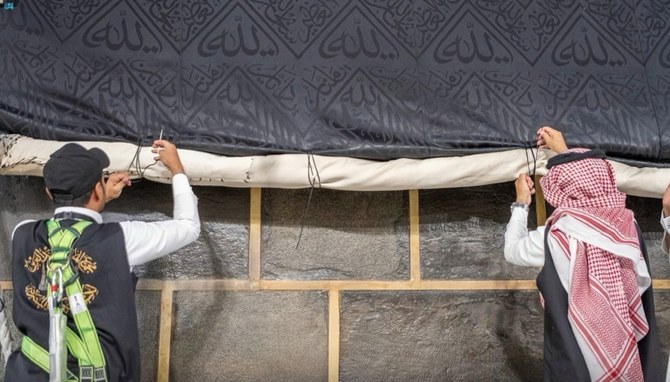
- The procedure is meant to keep the cover, known as kiswa, free from getting soiled and tampered with as pilgrims performing Hajj circumabulate the Kaaba
RIYADH: In keeping with the annual tradition, officials raised the lower part of the kiswa — the elaborately designed black cloth covering the Kaaba — in Makkah on Wednesday ahead of this year's Hajj pilgrimage.
As approved by the General Authority for the Care of the Affairs of the Two Holy Mosques, the exposed part was covered with a white cotton fabric, two-and-a-half meters wide and 54 meters long on all four sides, according to the Saudi Press Agency.
Carrying out the procedure were 36 specialized technical personnel with the aid of 10 cranes.
As described in the SPA report, the kiswa is lifted in several stages: It starts with unscrewing the bottom of the cover from all sides, separating the corners, then untying the bottom rope and removing it from the fixing rings, after which the cloth is rolled upward. The lanterns are then dismantled and the white cloth are put in place, after which the lanterns are reinstalled over the white cloth until the final stage.
The procedure is repeated every year to protect the kiswa from getting soiled and damaged as pilgrims circumambulate the Kaaba.
The annual Hajj in Saudi Arabia is considered the world's largest human gathering, with year 2012 marking the biggest number of participants at 3.16 million.
At the height of the COVID-19 pandemic, Saudi authorities allowed only a symbolic observance of Hajj with just a thousand pilgrims. The numbers were gradually raised as the health crisis was placed under control worldwide. Last year, almost 1.84 million pilgrims performed the "once in a lifetime" journey and the figure is expected to go higher this year.
Every year, on the ninth day of the Islamic month of Dul Hijjah, the black silk cloth is removed and a new kiswa is draped in its place.
Saudi authorities limit entry to Makkah to Hajj visa holders
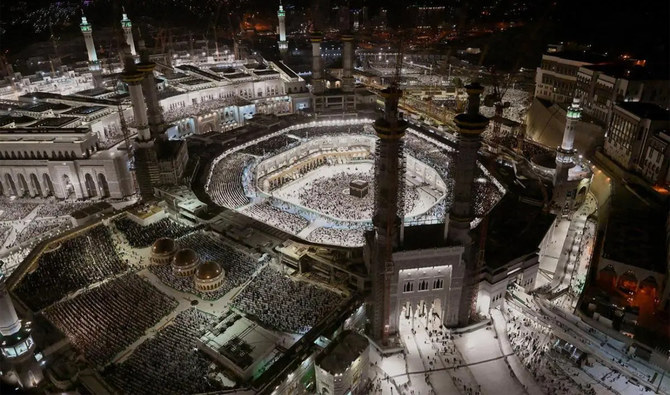
RIYADH: Saudi Arabia’s Ministry of Interior announced that visit visa holders are not allowed to enter or stay in Makkah during May 23-June 21 as access to the city will be limited to Hajj visa holders.
The ministry stressed that all types of visit visa are not a permit to perform Hajj, adding that violators will be subject to penalties according to Saudi laws and regulations.
Saudi FM in Tehran conveys king, crown prince condolences for Iran president death
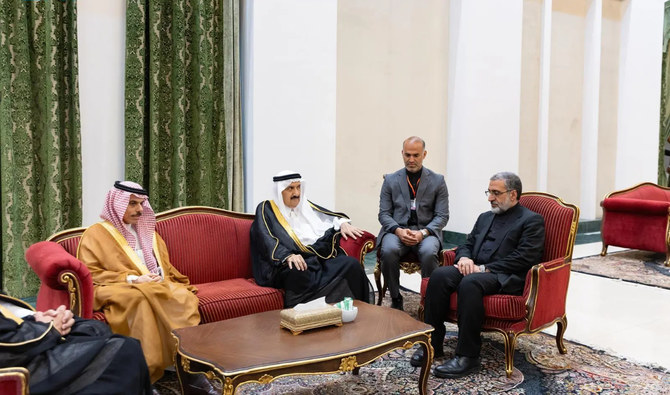
RIYADH: Prince Faisal bin Farhan, Saudi Arabia’s Foreign Minister, conveyed the condolences of King Salman and Crown Prince Mohammed bin Salman to top Iranian officials in Tehran on Wednesday on the death of President Ebrahim Raisi and his companions.
Prince Mansour bin Muteb bin Abdulaziz, Adviser to King Salman and Minister of State, and Prince Faisal were received by Deputy Chief of Staff for Political Affairs to Iran President Mohammad Jamshidi and Foreign Minister Ali Bagheri Kani.
Saudi ambassador to Iran Abdullah Al-Enazi attended the reception.


